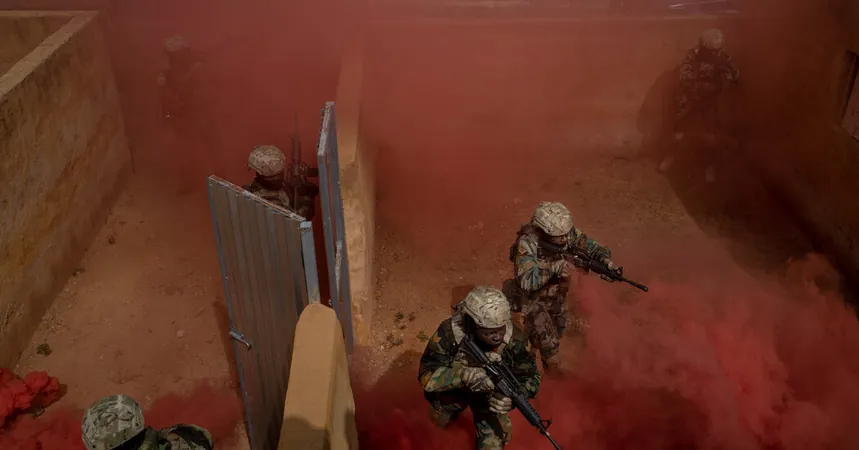
France's Withdrawal from Ivory Coast: What It Means for West Africa's Future
2025-01-02
Author: Ying
Introduction
In a significant shift in military relations, Ivory Coast has officially announced the withdrawal of French forces from its territory, marking a waning of French influence in West Africa. President Alassane Ouattara made the announcement during a nationally televised address, emphasizing the modernization of the Ivorian Army and the decision to carry out an organized and coordinated exit of French military personnel.
Details of the Withdrawal
French troops are set to depart this month, following the handover of a military camp located in a suburb of Abidjan, Ivory Coast's economic capital. This decision follows a trend of similar withdrawals from neighboring countries, including Chad and Senegal, which raises questions about France's diminishing military footprint in the region.
Historical Context
Once a dominant force in West Africa, France's military presence will soon be confined to Djibouti and Gabon, a stark contrast to the extensive troop deployments it maintained in the Sahel to combat jihadist threats just three years ago. President Ouattara expressed pride in the Ivorian Army's advancements, indicating that the approximately 600 French military personnel were no longer necessary.
Growing Discontent Against French Presence
The sentiment against French military presence has escalated across former colonies, often characterized by accusations of neocolonialism and patronizing attitudes. Senegal's recent political changes reflect this growing discontent, as opposition leaders successfully campaigned on a platform advocating for "sovereignty" from French influence.
Ivory Coast's Unique Position
However, the situation in Ivory Coast is distinct. Ouattara is often viewed as a strong ally of France, especially after the controversial removal of his predecessor, Laurent Gbagbo, in 2011 with French military involvement. Despite his allies' waning support in the region, Ouattara has strategically maintained his status as one of France's last significant supporters in Africa.
Political Implications for President Ouattara
At 83, Ouattara won a third term in 2020, pushing against the constitutional two-term limit. As he contemplates his political future, some analysts perceive the announcement of French troop withdrawal as a tactical move to align himself with a populace increasingly critical of foreign military presence and perceived violations of national sovereignty.
France's Military Strategy Reform
French President Emmanuel Macron, through his special envoy to Africa, Jean-Marie Bockel, has been intensely reforming France's military strategy in the region. Last February, Bockel advocated for a re-evaluation of the French military base in Ivory Coast, highlighting the need for a transformed approach.
Broader Discussions of Sovereignty
This military retraction comes alongside broader discussions of sovereignty across West Africa. As President Faye of Senegal has made it clear that there will be no French military presence there by 2025, a joint statement from the military leaders of Chad, Senegal, and Ivory Coast indicated that the closure of military bases could be a strategic attempt to obscure what they consider France's neocolonial tendencies.
Continued Military Cooperation?
Despite the troop withdrawals, a French Defense Ministry spokesperson asserted that the decisions do not undermine the established military cooperation. He reiterated that the partnership between the two nations remains based on mutual trust and shared operational goals.
Conclusion: Challenges and Opportunities
Ultimately, the French withdrawal poses challenges and opportunities for Ivory Coast and the broader West African region. France continues to bolster its counter-terrorism initiatives, with collaborative efforts in training and education, such as the establishment of an international counterterrorism academy in Abidjan in 2021, supported by multiple Western allies, including the United States.
As Ivory Coast stands at a crossroads, the implications of French withdrawal will reverberate throughout West Africa, prompting critical evaluations of national sovereignty, regional security, and the future of international alliances in a rapidly changing geopolitical landscape.


 Brasil (PT)
Brasil (PT)
 Canada (EN)
Canada (EN)
 Chile (ES)
Chile (ES)
 Česko (CS)
Česko (CS)
 대한민국 (KO)
대한민국 (KO)
 España (ES)
España (ES)
 France (FR)
France (FR)
 Hong Kong (EN)
Hong Kong (EN)
 Italia (IT)
Italia (IT)
 日本 (JA)
日本 (JA)
 Magyarország (HU)
Magyarország (HU)
 Norge (NO)
Norge (NO)
 Polska (PL)
Polska (PL)
 Schweiz (DE)
Schweiz (DE)
 Singapore (EN)
Singapore (EN)
 Sverige (SV)
Sverige (SV)
 Suomi (FI)
Suomi (FI)
 Türkiye (TR)
Türkiye (TR)
 الإمارات العربية المتحدة (AR)
الإمارات العربية المتحدة (AR)